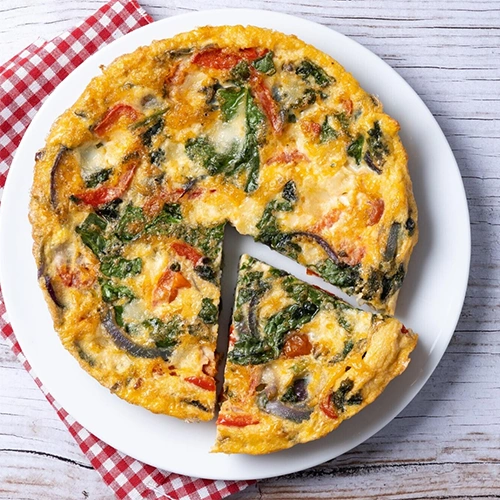

Top Health Benefits of Easy Veggie Frittata You Need to Know
This vegetable and cheese frittata is a highly nutritious dish that delivers a well-balanced mix of essential macronutrients and micronutrients. Packed with high-quality protein from eggs and cheese, it supports muscle maintenance and satiety, making it an excellent choice for any meal of the day. The inclusion of colorful vegetables like spinach, peppers, and onions provides fiber, antioxidants, and vital vitamins such as A, C, and K, which contribute to immune function, heart health, and healthy skin. The use of olive oil adds heart-healthy monounsaturated fats, aligning with Mediterranean diet principles. Additionally, the relatively low carbohydrate content makes it ideal for low-carb eating patterns. This dish is naturally gluten-free and customizable to enhance or reduce calorie content, depending on dietary needs.
 Chicken Egg : 6 Piece
Chicken Egg : 6 Piece Cow Milk : 1/4 Cup
Cow Milk : 1/4 Cup Onion : 1 Piece
Onion : 1 Piece Bell Pepper : 1 Piece
Bell Pepper : 1 Piece Spinach : 1 Cup
Spinach : 1 Cup Cheddar : 1/2 Cup
Cheddar : 1/2 Cup Olive Oil : 2 Tablespoon
Olive Oil : 2 Tablespoon Salt : as needed
Salt : as needed black pepper : to taste
black pepper : to taste Tomato : 1 Piece
Tomato : 1 PieceRecipe :
For 4 people
Enjoy your healthy and flavorful homemade vegetable frittata!
When preparing a frittata, it's crucial to use a non-stick, oven-safe skillet to ensure an even cook and easy removal from the pan. Be sure to sauté the vegetables before adding the eggs to release moisture and intensify flavor, as excess liquid can make the frittata soggy. Use medium to low heat when starting the cook on the stovetop to prevent the eggs from browning too quickly. Adding a splash of cream or milk to the eggs helps improve texture and fluffiness. When baking, keep an eye on the oven, as overcooking can lead to a dry and rubbery consistency. Let the frittata rest for a few minutes after removing it from the oven to allow it to firm up and slice cleanly. Season appropriately, and consider choosing cheeses and add-ins that align with your dietary preferences and restrictions.

This frittata is highly versatile and fits into several popular diets. It is suitable for ketogenic, Mediterranean, vegetarian, gluten-free, high-protein, low-calorie, and DASH diets when prepared mindfully. For ketogenic and low-carb diets, it provides excellent fats and proteins while keeping carbs minimal. The Mediterranean diet benefits from the use of olive oil and nutrient-dense vegetables. For DASH, using low-sodium cheese and minimal salt is recommended. However, this dish is not suitable for vegan diets due to the inclusion of eggs and cheese, though a plant-based version using tofu and vegan cheese can be created. It's also not strictly paleo, as dairy is typically excluded in paleo guidelines, unless using approved non-dairy substitutes. Individuals with dairy intolerance should opt for lactose-free cheese or omit dairy entirely. Always tailor the recipe according to specific dietary needs and consult a nutritionist when in doubt.
Mia (May 20, 2025, 9:59 a.m.) : 👌👌🤩